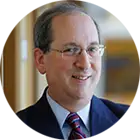Secretary / CEO
Frederick M. Lawrence

Frederick M. Lawrence is the 10th Secretary and CEO of the Phi Beta Kappa Society, the nation’s first and most prestigious honor society, founded in 1776. Lawrence is a Distinguished Lecturer at the Georgetown Law Center, and has previously served as president of Brandeis University, Dean of the George Washington University Law School, and Visiting Professor and Senior Research Scholar at Yale Law School. He was elected to the American Philosophical Society in 2018 and the American Law Institute in 1999. Lawrence is the recipient of the 2019 Ernest L. Boyer Award from the New American Colleges and Universities, and the Council of Colleges of Arts and Sciences’ Arts & Sciences Advocacy Award in 2018.
An accomplished scholar, teacher and attorney, Lawrence is one of the nation’s leading experts on civil rights, free expression, bias crimes, and higher education law. Lawrence has published widely and lectured internationally. He is the author of Punishing Hate: Bias Crimes Under American Law (Harvard University Press 1999), examining bias-motivated violence and how such violence is punished in the United States. He frequently contributes op-eds to various news sources, such as Newsweek, the Boston Globe, the Philadelphia Inquirer, US News and the NY Daily News, and has appeared on CNN, MSNBC and Fox News among other networks.
Lawrence has testified before Congress concerning free expression on campus and on federal hate crime legislation, was the key-note speaker at the meeting of the Organization for Security and Cooperation in Europe (OSCE) on bias-motivated violence, was a Senior Research Fellow at University College London, and the recipient of a Ford Foundation grant to study bias-motivated violence in the United Kingdom. Lawrence is a trustee of Beyond Conflict, serves on the Board of Directors for the American Association of Colleges and Universities, the Executive Committee of the Board of Directors of the National Humanities Alliance, the Editorial Board of the Journal of College and University Law, and the National Commission of the Anti-Defamation League, and has been a Trustee of Williams College and WGBH.
At Phi Beta Kappa, Lawrence has focused on advocacy for the arts, humanities and sciences, championing free expression, free inquiry and academic freedom, and invigorating the Society’s over 290 chapters and nearly 50 alumni associations. As president of Brandeis, Lawrence strengthened ties between the university and its alumni and focused on sustaining the university’s historical commitment to educational access through financial aid. His accomplishments during his presidency included restoring fiscal stability to the university and overseeing record setting increases in admissions applications, undergraduate financial aid and the university’s endowment. An acclaimed teacher, Lawrence taught an undergraduate seminar on punishment and crime that was one of the most popular undergraduate courses offered at Brandeis. He revitalized the university’s Rose Art Museum, recruited and hired a new museum director, and commissioned the Light of Reason sculpture, creating a dynamic outdoor space for the Brandeis community.
Prior to Brandeis, Lawrence was dean and Robert Kramer Research Professor of Law at George Washington University Law School from 2005 to 2010. During his time at GW Law, Lawrence recruited the strongest classes in the school’s history, and his five years as dean were five of the six highest fund-raising years in the school’s history. He was Professor of Law at Boston University School of Law from 1988 to 2005, during which time he served as Associate Dean for Academic Affairs and received the Metcalf Award for Excellence in Teaching, the university’s highest teaching honor.
Lawrence’s legal career was distinguished by service as an assistant U.S. attorney for the southern district of New York in the 1980s, where he became chief of the Civil Rights Unit. Lawrence received a bachelor’s degree in 1977 from Williams College magna cum laude where he was elected to Phi Beta Kappa, and a law degree in 1980 from Yale Law School where he was an editor of the Yale Law Journal.
